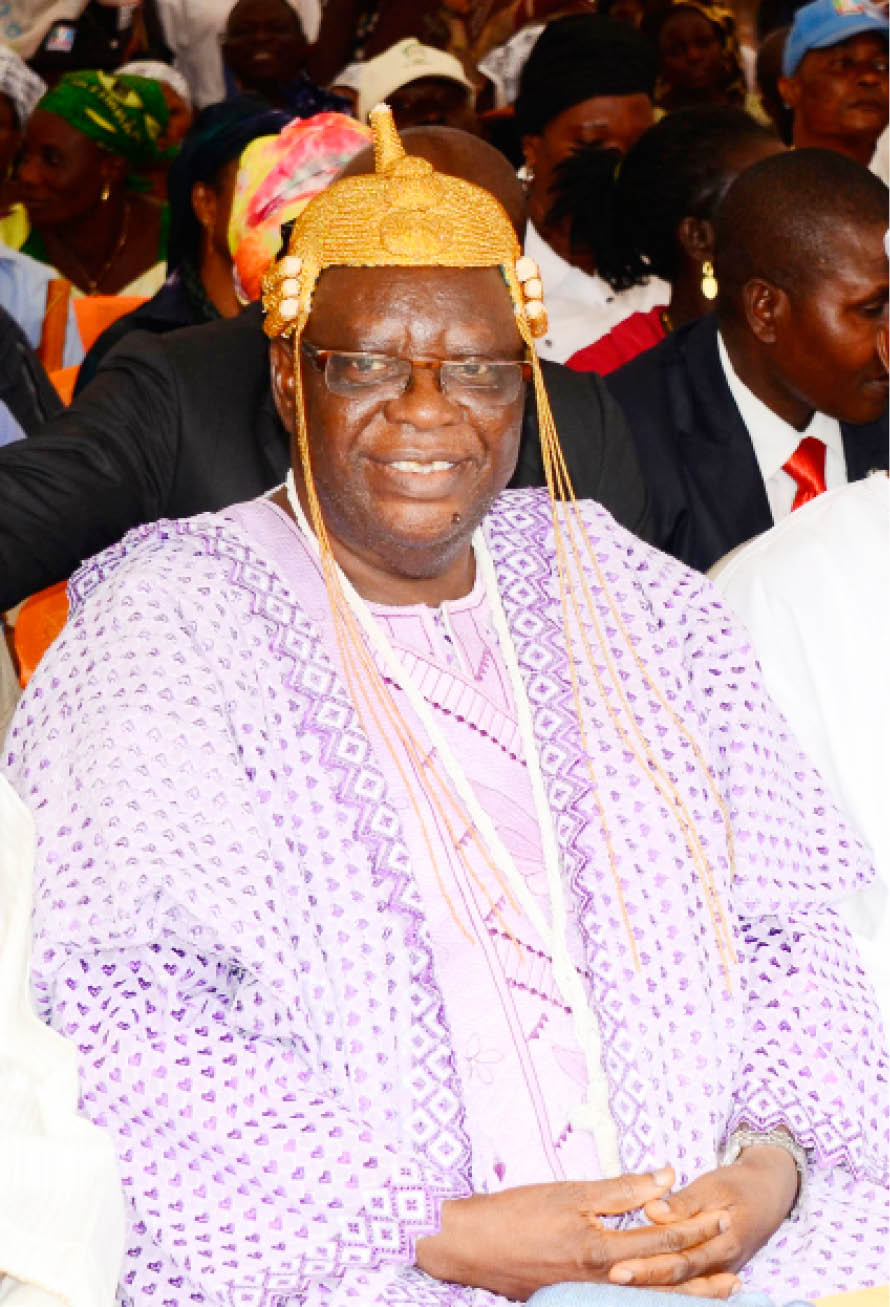Following the demise of the then Akire of Ikireland, Oba Boladale Oseni Oyegunle in 1987, the traditional stool became vacant and the battle to succeed him started.
When the then government of Oyo State, where Ikire (now in Osun State) was located, set machinery in motion to fill the vacant stool, candidates from various royal families indicated their interests.
- After Supreme Court judgement, confusion in Osun town over 27-year-old Obaship tussle
- Royal rumble: Family drags Gov Fayemi to court, wants Oba-elect disqualified
Subsequently, the kingmakers at that time were said to have submitted the name of a prince from the Aketula ruling family, Tajudeen Ijaduola Olanrewaju, to the then military administrator of Oyo State, Col Adetunji Olurin (retd) following his nomination by the ruling family and after fulfilling the conditions to become the Akire of Ikire.
Olarenrewaju was waiting for an official announcement by Olurin and warming up to become the new Akire of Ikire; in fact, arrangements had been concluded for his installation when controversy suddenly came up.
One of the ruling houses, Ladekan, had faulted the Chieftaincy Declaration of 1958, under which the prince was nominated.
This ruling house insisted that Prince Olarenrewaju could not become the next Akire, claiming that Aketula, which produced him, was not a valid ruling house in the town.
This development halted the process as the Ladekan ruling house ran to the High Court in Ile-Ife to challenge the inclusion of the Aketula house in the Akire of Ikire Chieftaincy Declaration of 1958.
Based on the court case, the military administrator could not announce the appointment of Prince Olanrewaju as the new Akire of Ikire.
In a chat with our correspondent at his residence in Ikire, Prince Olanrewaju, in an emotion-laden voice, narrated how the action of the Ladekan ruling house prevented him from becoming the traditional ruler of the community.
“I was duly nominated in 1987 to become the next Akire when the stool became vacant after the demise of the immediate past Akire, Oba Oyegunle.
“My nomination from the Aketula ruling house was based on the 1958 Akire of Ikire Chieftaincy Declaration.
“My nomination went through all the required processes and was approved by the kingmakers and forwarded to the then Oyo State Government to announce my appointment and install me as Akire.
“But a suit filed at Ile-Ife High Court by the Ladekan ruling house halted the process of my installation and scuttled my joy,” he recalled.
While the case was going on, another ruling family, Lanbeloye, nominated Prince Olatunde Falabi for the throne.
Without wasting time, his appointment was announced and he was installed as the new Akire. Falabi has been on the throne since then.
Prince Olanrewaju felt that Falabi took advantage of the situation, so the case moved to the Appeal Court, Ibadan.
The Appeal Court restrained the military administrator from installing Falabi as Akire, but it was too late.
After his installation, Falabi proceeded to the Supreme Court to set aside the order of the Appeal Court.”
From 1987, the case kept dragging.
However, on April 11, 2014, the Supreme Court, in a unanimous judgement delivered by Justice Walter Samuel Nkanu Onnoghen, Justice Sulieman Galadima, Justice Bode Rhodes-Vivour, Justice Kumai Bayang Aka’AHs and Justice John Inyang Okoro, eventually favoured Prince Olanrewaju and his Aketula ruling house by affirming that the 1958 Akire of Ikire Chieftaincy Declaration, by which the government of the old Oyo State commenced the filling of the vacant stool of the community after the demise of Oba Oyegunle in 1987, remained valid and the only means by which a successor could be appointed.
This happened 27 years after the tussle began, when Ogbeni Rauf Aregbesola was the governor of Osun State.
When Olanrewaju eventually won the case at the apex court, Ikire erupted in jubilation.
But the incumbent monarch, Oba Falabi, through his legal team, contended that the Supreme Court did not specifically order his removal from the throne; hence he remained the Akire in spite of the judgement.
This caused confusion in the state as Prince Olanrewaju was only waiting for the then Governor Aregbesola to implement the judgement of the Supreme Court and install him as the new Akire.
When this was not done, Olanrewaju, through his lawyer, Emmanuel Abiodun, wrote a letter to the governor, dated April 22, 2014, urging him to act appropriately.
But Oba Falabi was already at Ikire High Court seeking to prevent the state government from deposing him.
According to suit number HRE/08/2014 filed by his lawyer, Chief Nathaniel Oke, a Senior Advocate of Nigeria (SAN), Oba Falabi stated that he had not committed any offence to warrant his deposition.
In his statement of claim at the Ikire High Court, the embattled traditional ruler stated that Aregbesola told him to prepare to vacate the throne.
He added that the then commissioner for justice, who was at the meeting, told him that an alternative arrangement for a comfortable accommodation would be made for him in any other town he desired, with some money to live the rest of his life because they (government) wanted his deposition to be peaceful.
But he rejected the offer, an action that did not go down well with Aregbesola and the commissioners for justice and chieftaincy affairs, who was also at the meeting.
The embattled monarch said the attorney-general of the state told him at the meeting that it would be in his interest to leave the throne peacefully.
When the matter came up at the Ikire High Court, the presiding judge, Justice R.A Shiyanbola, dismissed Falabi’s prayer and struck out the case, but his counsel said that action was not the end of the matter.
Subsequently, residents, including market women, commercial motorcyclists, artisans and other categories of people in the community and neighbouring towns started paying homage to Prince Olanrewaju in his residence.
Again, Oba Falabi ran back to another High Court with another suit, with reference number HRE/09/2014.
On May 23, the traditional ruler, through his counsel, Nathaniel Oke, sought an interlocutory injunction restraining the then Governor Aregbesola from dethroning him pending the determination of the substantive suit.
But the counsel to Prince Olanrewaju, Olalekan Thanni, in a counter affidavit, stated that “the judgment of the Supreme Court already set aside the appointment of Oba Falabi as Akire.”
The case moved from one judge to another until Monday, July 29 when Justice A. B. AbdulKareem held that Oba Falabi had no legal right to occupy the seat of Akire of Ikire.
The judge further held that Tajudeen was entitled to the throne, not Falabi.
Since the latest judgement was delivered, riot policemen and operatives of the Nigeria Security and Civil Defence Corps were deployed to the palace to maintain law and order.
Prominent indigenes of the town refused to speak on the matter.
Meanwhile, the state government has not reacted to the judgement. One of Governor Gboyega Oyetola’s aides, who spoke with Daily Trust on Sunday on condition of anonymity, said his principal was silent because Falabi may decide to move to the Appeal Court.

 Join Daily Trust WhatsApp Community For Quick Access To News and Happenings Around You.
Join Daily Trust WhatsApp Community For Quick Access To News and Happenings Around You.


